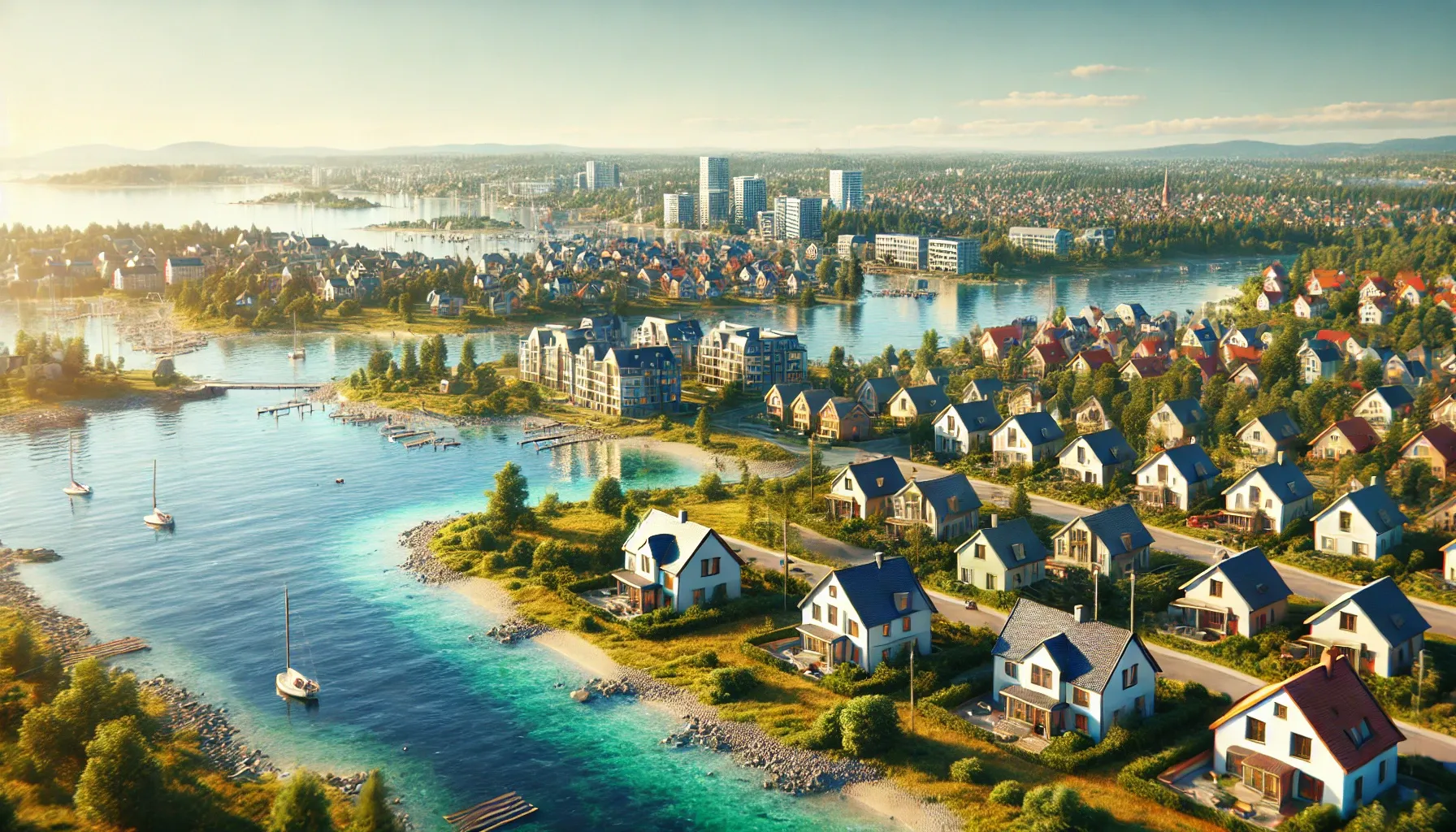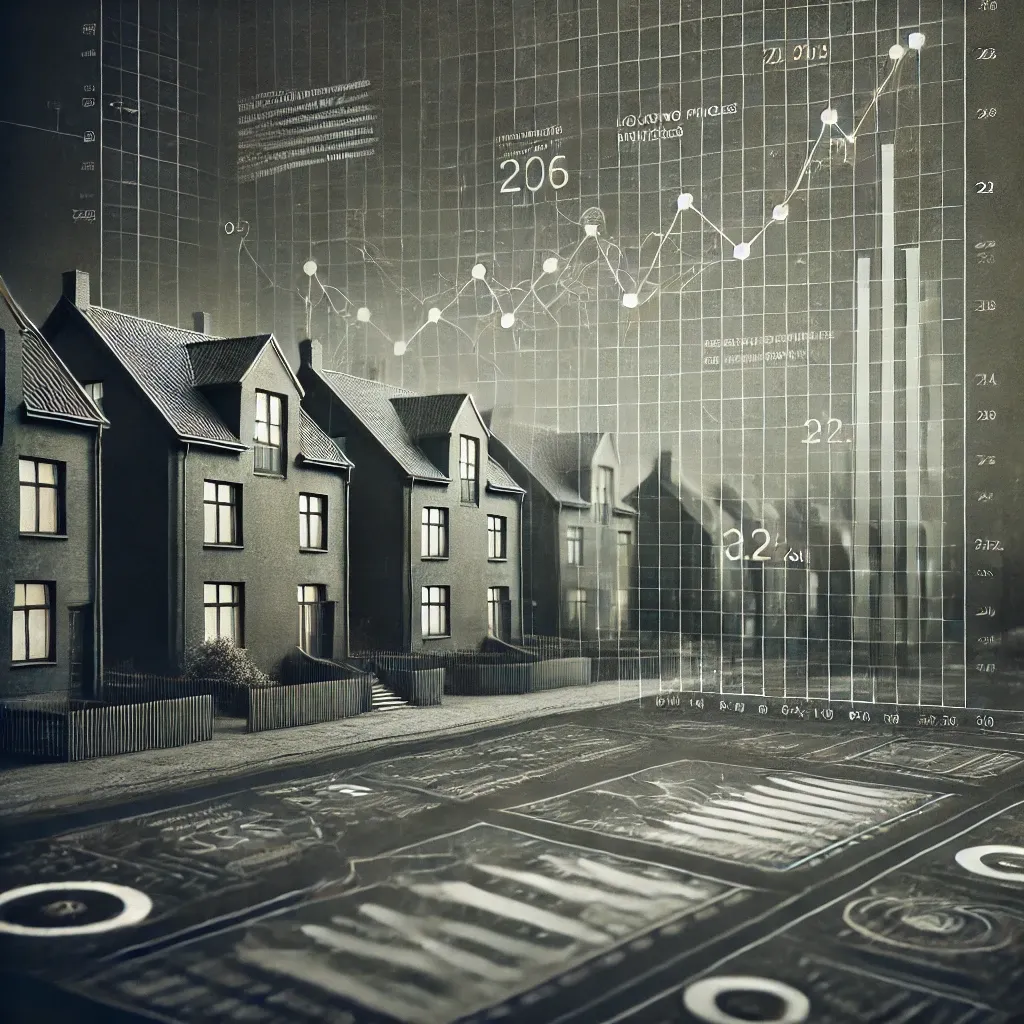Why is the Danish real estate market losing its investment appeal?

- What is the investment attractiveness of the real estate market in Denmark?
- Why did the Danish real estate market experience a price drop in 2006?
- What are the conditions for foreigners to purchase real estate in Denmark?
General information about Denmark
Denmark is an island nation that ranks among the leaders in the global ratings for the level of democratic processes. This country stands out for its highly developed structural social aspects, an education system accessible to all, optimal conditions for entrepreneurship with minimal bureaucratic barriers, and outstanding results in fulfilling contractual obligations.
The social atmosphere in Denmark
The people of Denmark, both men and women, enjoy living in an atmosphere of calm and confidence in the future, which is ensured by a stable economy, a stable political situation and a reliable legal system. However, despite these positive aspects, the real estate market in the country has low investment attractiveness. This can be characterized by the phrase of a famous classic: "There is something wrong in the Danish kingdom".
Investment attractiveness of the real estate market
The consulting company Global Property Guide rates Denmark at just 1 out of 5 possible points for investment attractiveness. The main factors contributing to this are a strict immigration policy that makes it difficult for foreigners to purchase real estate, an oversupply of properties on the market, a significant tax burden on income, and moderate taxes on rental income.
Real estate market: price growth
The real estate market in Denmark is experiencing a real shock. In recent years, Scandinavian countries, especially their capitals, have been leading in the growth rates of residential property prices, a phenomenon known as the "Scandinavian boom." For example:
- In 2006, the average housing price in Norway increased by 16.7%.
- In Sweden, it's up 10.5%;
- And in Estonia, which has just become part of the EU, it is a full 28.6%.
Denmark occupies the third position in this picture with a price increase of 12.3%. Over a period of 13 years of rapid growth, Copenhagen has witnessed an astonishing 620% increase in property values, while the national figure reached 373%.
Comparison of housing prices
Interestingly, compared to other capitals of neighboring countries, housing prices in Copenhagen are still lower. According to Global Property Guide:
- In 2006, the price of a luxury apartment measuring 120 square meters in the center of Copenhagen was 3,784 euros per square meter.
- By comparison, in Dublin this figure was as high as €5,000;
- In Oslo – 5117 euros;
- And in Amsterdam – 6667 euros per square meter;
- In Moscow, a similar apartment cost 6266 euros per square meter.
Economic factors of growth
When it comes to the reasons for the rise in real estate prices in Denmark, experts highlight:
- Stable economic growth, which continues to grow;
- Growth of gross domestic productper capita, reaching 35,000 euros;
- Attractive conditions for foreign investorsincluding low interest rates on loans.
These factors combine to create a favorable environment for economic development, which ultimately leads to the activation of the real estate market. Moreover, the high standard of living, supported by social programs and a quality education system, has a favorable effect on attracting investors willing to invest in real estate, despite the fact that the rights of foreign buyers remain rather limited.
Conclusion
Thus, despite the positive trends and dynamics in the market, many potential investors may face significant challenges when trying to enter this highly competitive segment of real estate.
At the same time, the real estate market is always subject to cycles, experiencing waves of intense growth followed by inevitable phases of calm. During such moments, market participants face the need to adapt to a new environment and recognize the current needs that have arisen against the backdrop of changing conditions. This can be illustrated by the example of Denmark in mid-2006: here, housing prices, having reached their peak, significantly slowed their growth dynamics.
An analysis of housing cost indices comparing the end of 2006 and 2005 demonstrates that although prices have increased, this increase has been at a much lower rate. In particular, the value index for detached houses rose by only 12.6% in 2006, whereas in 2005 this figure was 23%. The rate of increase in apartment prices more than tripled, amounting to 8.9% compared to 28.5% in the previous year.
Price dynamics in 2006
Nevertheless, if we look at the results of the last six months of 2006, we can see that in some segments the market showed a decline in prices. For example, the average cost of single-family homes across the country decreased by 6.7%, amounting to 1.651 million Danish kroner (approximately 222,207 euros). In Copenhagen, the losses in the apartment market during this six-month period were around 12%, and their average price by the end of the year was at the level of 305,426 euros.
At the same time, such dynamics did not affect the prices of individual houses in the capital, which continued to grow, although less actively than before: the rate of increase amounted to 2.8% for the second half of 2006, reaching 542,271 euros.
Factors of changes in market trends
Analysts highlight two key factors that have influenced changes in market trends:
- Market saturation:between 2003 and 2006, about 26,000 new housing units were commissioned in Denmark each year, compared with no more than 16,000 between 1995 and 2002.
- Rising interest rates:This was caused by an increase in the refinancing rate from 2% to 3.75%. As a result, by March 2007, the average interest rate on mortgage loans reached 5.4%, significantly exceeding the 3.7% figure from 2005.
State control and its consequences
In addition, another factor that influenced the slowdown in real estate price growth in Denmark was the government's strict control over rents. For example, between 2000 and 2005, when the value of private houses increased by 47.3% and apartments by 87.1%, rents rose by only 13.6%.
The laws regulating rental relationships in Denmark are primarily aimed at protecting the rights of tenants, which creates obstacles for landlords in achieving an annual income higher than 5% of the property's value.
29 January
9 October 2024
9 October 2024
29 September



The current situation in the Danish real estate market
Today, the residential market in Denmark shows signs of temporary stagnation, which, according to experts, creates a good opportunity for a thoughtful choice among the proposals.
The range of options in the market is quite extensive, and there is an opportunity to negotiate a reasonable price with property owners. However, it should be noted that the process of purchasing housing for foreigners in Denmark comes with a number of challenges.
Immigration policy and its impact
These restrictions are mainly related to immigration policy, which aims to maintain the demographic structure of the Danish population, where approx.90%are made by the Danes themselves.
Despite the existing barriers, it is important to realize that this is not an insurmountable obstacle for those who want to become property owners. Note that similar restrictions apply in other European countries, including those in the European Union, so Denmark is no exception to this rule.
Conditions for EU citizens and other countries
- EU citizens can only become property owners in Denmark if their stay in the country is related to professional activities.
- Citizens of non-EU countries can also count on the possibility of buying real estate, but only if they have spent at least five years in the country or have a residence or business permit.
Corporate real estate acquisition process
Additionally, there is an alternative known as the "corporate" scheme for acquiring real estate. This involves creating a legal entity in Denmark, which simplifies the purchasing process, similar to a Russian limited liability company.
Restrictions in tourist areas
It is important to emphasize that the most restrictions apply to properties located on the coast and in tourist areas.
This is due to the government's desire to prevent the mass purchase of summer houses by Germans, which could reduce the number of native Danes in these areas. There are therefore strict laws on the subject.
Loopholes in the legislation
However, there are certain "loopholes" in Danish law. If the property purchased is classified as a "permanent residence" and is not located in a predetermined resort area, the purchase process may become more accessible even for non-EU residents.
Ordinary procedures for such purchases are carried out by specialized real estate companies, offering professional consultations and assistance in preparing the necessary documents.
Features of buying real estate
It is also worth paying attention to some peculiarities of the process of acquiring real estate in Denmark. First of all, it is necessary to obtain authorization for the transaction in the Ministry of Justice of the country, which, of course, requires time and additional efforts.
Therefore, it is important for future buyers to be prepared for the various nuances that may arise on the path to acquiring the desired property. This will require attentiveness and patience from those who intend to invest in Danish real estate.
Conclusion
In conclusion, I want to say that Denmark, while appearing to be a model of stability and prosperity, cannot boast of ideal conditions for real estate investment. The country, which has a magnificent democratic system and a high quality of life, faces a number of serious issues that inevitably affect the investment attractiveness of its real estate market.
On one hand, we all appreciate the impressive achievements in education and social welfare that delight the residents of Denmark. There are indeed high standards of living here; however, as practice shows, this does not always translate into profitable opportunities for investors.Tough immigration policyandhigh tax ratesdiscourage foreign buyers and complicate the process of purchasing housing. As a result, the market is oversaturated and housing prices begin to fluctuate.
Price Fluctuations
We see that in recent years there have been noticeable changes in the dynamics of prices for apartments and houses. The market has repeatedly demonstrated cycles of growth and stagnation, and each new peak in prices often turns out to be a harbinger of profound changes. Against the backdrop of slow economic growth and changes in mortgage interest rates, the stability that was once considered the foundation of the Danish market may once again be put to the test.
Opportunities for Investors
However, this does not mean that the chances of a successful investment in Danish real estate are completely exhausted. On the contrary, it is possible to find your own unique opportunities amidst all of the above challenges. Investors who are willing to analyze the market more deeply and look for unconventional approaches can benefit even in a relatively tight market.
Important to Remember:
- Denmark remains an attractive place to live..
- Potential investors should carefully study the market..
- Every detail can be important in making a decision..
- A challenging market promises both challenges and opportunities for growth.
Ultimately, Denmark, with its complex yet intriguing real estate market, promises not only challenges but also opportunities for growth and development. So in this land of contrasts, it is important to narrow the focus, and perhaps the emergence of new opportunities is already on the horizon.
Comment
Popular Posts
9 October 2024
1485
9 October 2024
9939
29 September
374
Popular Offers

Subscribe to the newsletter from Hatamatata.com!
Subscribe to the newsletter from Hatamatata.com!
I agree to the processing of personal data and confidentiality rules of Hatamatata







